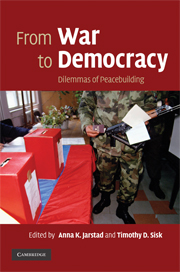Book contents
- Frontmatter
- Contents
- List of tables
- About the authors
- List of acronyms
- Acknowledgments
- Introduction
- Part I The perils of war-to-democracy transitions
- Part II The security context
- Part III The political process
- 4 Power sharing: former enemies in joint government
- 5 When rebels change their stripes: armed insurgents in post-war politics
- 6 Post-war elections: uncertain turning points of transition
- 7 Civil society in war-to-democracy transitions
- Part IV International engagement
- References
- Index
6 - Post-war elections: uncertain turning points of transition
Published online by Cambridge University Press: 14 May 2010
- Frontmatter
- Contents
- List of tables
- About the authors
- List of acronyms
- Acknowledgments
- Introduction
- Part I The perils of war-to-democracy transitions
- Part II The security context
- Part III The political process
- 4 Power sharing: former enemies in joint government
- 5 When rebels change their stripes: armed insurgents in post-war politics
- 6 Post-war elections: uncertain turning points of transition
- 7 Civil society in war-to-democracy transitions
- Part IV International engagement
- References
- Index
Summary
Elections held as part of a peace deal following a violent conflict highlight several crucial dilemmas of democratization in post-war societies. Such “post-war elections” are now a feature of almost all efforts to democratize war-torn regions, with peace agreements routinely including provisions for elections to be held as part of the process of conflict termination, often with the assistance, supervision, or sometimes direct control of the international community. But while post-war elections have become an integral element of contemporary peace agreements, they can also themselves become the focus of increasing tension and renewed violence. Taking a comparative perspective, this chapter focuses on several inherent dilemmas of post-war elections, including issues of timing, sequencing, mechanics, political parties, and the role of the international community. In each of these areas, post-war elections force difficult choices to be made between short-term versus long-term priorities, representation versus stability, domestic versus international legitimacy, and a range of other sometimes incompatible objectives.
These dilemmas are reinforced by the competing discourses that dominate both academic and policy discussions of post-war elections. On the one hand, elections and democracy are often seen as a primary means of conflict management, with theorists arguing for the benefits of democratic competition in managing the tensions inherent in all societies, including war-torn ones (see Przeworski 1991). On the other hand, an increasing body of work points to the dangers of holding elections in conflict-prone societies, and the empirical reality that societies in the early stages of democratization are often more, not less, conflict prone (Snyder 2000).
- Type
- Chapter
- Information
- From War to DemocracyDilemmas of Peacebuilding, pp. 157 - 181Publisher: Cambridge University PressPrint publication year: 2008
- 17
- Cited by



